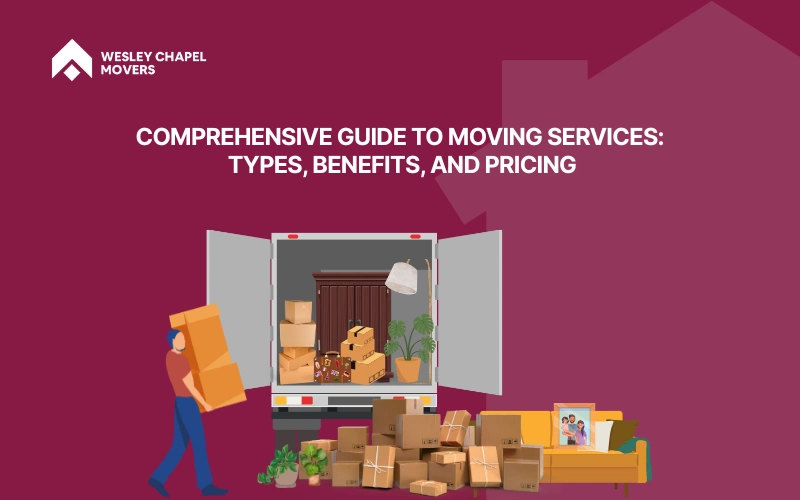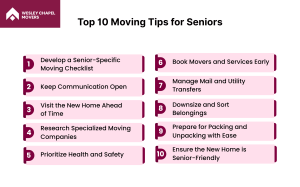Moving services assist individuals, families, and businesses in relocating their belongings efficiently and securely. These services support a wide range of moving needs, from short-distance residential transitions to complex commercial relocations and international freight logistics. By managing the physical, organizational, and timing-related aspects of a move, professional movers help reduce disruption, physical strain, and planning challenges.
In growing regions like Wesley Chapel, demand for structured relocation support has increased due to housing shifts, job relocations, and expanding business operations. Customers can now choose from full-service packages that include packing and storage, or more cost-sensitive options like self-service moves and labor-only support. Each offering is tailored to match the unique logistical and financial needs of the move.
This guide outlines the full spectrum of moving services available, explains the benefits of working with experienced providers, and details the variables that impact pricing. Whether planning a cross-town apartment move or coordinating a nationwide corporate transfer, readers will find factual, organized information to help make well-informed relocation decisions.
What Are Moving Services?
Moving services are businesses that specialize in relocating personal or business items from one location to another. Also known as moving companies or removalists, they support a range of needs, from local home moves to long-distance relocations and corporate transitions. These services reduce the physical and logistical burden of moving by providing labor, vehicles, equipment, and planning support.
The process typically begins with a consultation to assess item volume, access conditions, and special requirements. A tailored plan is then created, outlining services such as packing, loading, and storage. On moving day, a trained crew handles preparation and transport, using appropriate materials and tools. Deliveries may include tracking or scheduled arrivals, with unloading, reassembly, and optional unpacking at the destination.
Throughout the process, professional movers maintain clear communication, liability coverage, and a documented chain of custody to ensure the safety and accountability of client property. This operational model allows customers to delegate a physically intensive and time-sensitive task to professionals who follow an organized, risk-managed workflow.
What Is Full-Service Moving?
Full-service moving is a relocation solution where the company handles everything from packing and disassembly to transport, unloading, and unpacking. It is designed for customers who want maximum convenience with minimal physical effort.
This service is ideal for those with limited time, physical constraints, or complex moves involving large homes or fragile, high-value items. Movers bring all necessary tools and materials, ensuring that belongings are packed securely and handled with care.
Although more expensive than basic or self-service options, full-service moving significantly reduces the stress and workload of relocation. Pricing depends on factors such as move size, distance, access conditions, and optional services like storage or specialty handling.
Customers should weigh the value of time saved and physical convenience against the overall cost. For those who prefer a professionally managed, hands-off experience, full-service moving is often the most efficient and secure option.
Types of Movers
Movers are generally classified based on the scope of services they offer and the types of items or clients they serve. Understanding the main categories helps customers choose the right provider for their specific moving needs, whether the priority is budget, item sensitivity, or service level.
To make an informed decision, it’s helpful to understand the key differences between the main types of movers:
1. Professional Movers
Ideal for standard residential or office moves, these providers offer comprehensive support that includes packing, loading, transport, and unloading. Their trained teams use commercial-grade equipment and follow established protocols to ensure efficiency and safety.
- Pros: Convenient, time-saving, reduced risk of damage, fully insured.
- Cons: Higher service cost compared to basic options.
2. Specialty Movers
Trained to manage items that demand special handling, these movers are equipped to move fragile, valuable, or oversized belongings such as pianos, antiques, or medical equipment. Specialized packing materials and tools help prevent damage during transport.
- Pros: Precision handling, item-specific safety measures, expert techniques.
- Cons: Premium pricing due to equipment and specialization.
3. DIY Movers
For those who prefer cost control and active involvement, this option allows customers to manage packing and loading themselves. Services typically include truck rental or portable containers, with optional labor-only help if required.
- Pros: Budget-friendly, flexible timeline, full process control.
- Cons: Physically demanding, greater chance of oversight or errors.
Are Movers an Essential Service?
Yes, movers are considered an essential service when their work directly supports housing access, employment relocation, or business operations. For example, during the COVID-19 pandemic, moving companies in many states, including Florida, were permitted to continue operating under essential business classifications to help individuals relocate due to job changes, lease expirations, or emergency housing needs.
In such scenarios, moving companies must follow local health and safety mandates, such as using PPE, maintaining distancing protocols, and sanitizing equipment, to ensure safe service delivery. Their essential status allows people and organizations to complete necessary relocations without legal or logistical delays during critical periods.
What Are The Types Of Moving Services?
The main types of moving services include self-moving, specialty moving, international moving, freight moving, and corporate moving. Each type is designed to meet different relocation needs, ranging from budget-conscious DIY moves to complex business or international transitions. These service categories vary by scope, cost, item sensitivity, and logistical complexity. Understanding the function of each type helps customers choose the right solution based on distance, item type, and the level of professional support required.
Self-Moving Options
For those seeking maximum control and minimal expense, self-moving is a do-it-yourself approach where the customer manages packing, loading, and transport. These services typically involve truck or portable container rentals, with labor assistance available as an add-on. While highly cost-effective, it requires significant physical effort, planning, and time investment. This option is best suited for individuals with moving experience or small-scale relocations where budgets are tight. Understanding this type helps assess how much involvement and responsibility you’re willing to take on.
Speciality Moving Services
When the items being relocated are unusually fragile, oversized, or high in value, specialty movers provide the precision needed to handle them safely. These services are equipped to transport items like antiques, pianos, artwork, and even hazardous materials using protective gear, climate-controlled trucks, and trained handlers. Though more expensive, the peace of mind and lower risk of damage justify the cost for sensitive or irreplaceable possessions. This type is ideal for moves involving valuable collections or complex logistics. Knowing when to engage specialty movers can help prevent costly damage or delays.
International Moving Services
Moving to another country is more complicated than just covering a long distance. International moving services help by handling customs, cross-border compliance, and global logistics. These providers handle shipping coordination, documentation, and international freight options, including sea, air, and rail. Challenges such as customs clearance, timeline variability, and additional fees make professional guidance essential. This service suits expats, global employees, or businesses expanding internationally. Recognizing the structure of international moving helps prepare for the complexities of cross-border transitions.
Freight Moving Services
For large-scale or commercial relocations, freight moving services offer heavy-load transport designed for efficiency and volume. These typically include crated or palletized shipments via truck, rail, or shipping container, which are managed through detailed logistics planning. They are ideal for warehouse relocations, industrial equipment transport, or bulk deliveries. Businesses with high-volume moving needs benefit from the cost and coordination advantages this moving service provides. Knowing when to use freight services helps ensure logistical feasibility for large operations.
Corporate Moving Services
Office relocations and employee transitions require structured execution, and corporate moving services are built to deliver just that. These providers manage everything from packing and labeling to equipment transport and workspace setup, often guided by a dedicated move coordinator. The focus is on minimizing downtime and maintaining business continuity. This option works best for businesses relocating departments, opening new locations, or supporting employee transfers. Being familiar with corporate services helps align operational needs with reliable moving execution.
Residential Moving Services
When individuals or families plan to relocate from a house, apartment, or condominium, residential moving services offer tailored support to manage the entire process efficiently. These services typically include packing, loading, transport, unloading, and furniture setup, with attention to fragile or bulky household items. Movers use tools and techniques suited to residential environments, including narrow hallways, stairs, and elevators. This type is ideal for anyone transitioning between homes, especially when time, physical capacity, or moving experience is limited. Knowing what residential movers handle helps homeowners prepare for a smoother, less stressful move.
Local Moving Services
For relocations within the same city or metro area, local moving services offer flexible and often same-day solutions. These movers focus on short-distance transport and can quickly load, deliver, and unload items with minimal downtime. Local services are typically priced by the hour and can include packing or labor-only assistance. This option is best for smaller moves or time-sensitive schedules that do not require long-haul planning. Understanding the scope of local services allows customers to plan efficiently and avoid unnecessary logistics.
Immediate Moving Services
When time is limited and relocation cannot wait, immediate moving services are built to respond quickly. These services accommodate last-minute or emergency moves due to lease expirations, job changes, or unexpected life events. Challenges include limited availability, increased costs, and compressed timelines, but they offer critical support when flexibility is not an option. This type is best for customers needing same-day or next-day moving solutions with minimal planning time. Recognizing when to use immediate movers helps reduce stress in urgent scenarios.
Self-Move vs Movers
Choosing between self-moving and hiring professionals depends on cost, convenience, and complexity. Self-move options give customers full control but require physical effort and logistical planning, while professional movers offer comprehensive support with reduced workload. Self-service works best for small, simple moves, while professional assistance suits large or specialized relocations. Understanding the trade-offs between these two paths helps customers make decisions based on time, budget, and the nature of the move.
What Do Moving Companies Do?
Moving companies handle the physical relocation of belongings by offering structured services that make the process safer and more efficient. Their support spans various stages of a move, depending on the customer’s needs, and can range from individual tasks to comprehensive full-service packages. To better understand how they operate, it’s useful to look at the core functions they typically provide:
- Packing and Loading: Secure wrapping, boxing, and careful placement of items for safe transit.
- Shipping: Local, interstate, or international delivery of goods using the appropriate method.
- Temporary Storage: Short-term storage for clients with delayed move-ins or staged transitions.
- Relocation Planning: Comprehensive move coordination, often used for corporate or complex moves.
- Self-Pack Transport: Logistics and labor support for customers who handle their packing.
Packing and Loading Services
Before any move can begin, packing and loading form the foundation of a secure and efficient relocation. Crews bring all necessary materials, including boxes, stretch wraps, padding, and protective supplies, and use proven methods to protect fragile or high-value belongings. They disassemble furniture when needed and load items strategically to prevent shifting or damage during transit. This service is essential for clients with tight timelines, delicate belongings, or large inventories that require professional handling.
Shipping Options for Moving
To accommodate different distances and logistical requirements, moving companies offer several shipping methods. Local and regional moves typically rely on standard truck fleets, while long-distance and international relocations may involve rail, sea freight, or air cargo. The choice depends on factors such as speed, cost, volume, and delivery location. Understanding these shipping options helps customers plan the most efficient route for their belongings.
Temporary Storage Solutions
When immediate delivery is not possible, moving companies provide short-term and long-term storage solutions to bridge the gap. These include climate-controlled units, portable storage containers, or secured warehouse spaces. Items are labeled, inventoried, and stored safely until the customer is ready for final delivery. Storage services are particularly helpful during staggered move-ins, downsizing transitions, or real estate delays.
Relocation Services
Full-service relocation support is available for customers needing complete move coordination. These services cover everything from pre-move planning and inventory management to transport scheduling and post-move setup. They are commonly used by businesses relocating offices or employees, and by individuals managing long-distance or overseas moves. A dedicated relocation specialist may oversee the process to ensure seamless execution.
Self-Pack Movers
For customers who prefer to handle their packing but need help with transport and heavy lifting, self-pack mover services offer a flexible middle ground. The company supplies a truck or container, while the client packs items independently. Movers then step in to load, transport, and unload at the destination. This option allows for cost savings and packing control while still benefiting from professional logistics.
What Are The Benefits Of Using Moving Companies?
Hiring a moving company provides clear benefits such as safe handling, time efficiency, reduced physical labor, and organized logistics. Whether for residential or commercial relocations, these services help ensure safe transport, minimize disruption, and streamline the overall process, especially when time, logistics, or item sensitivity are concerns.
- Reliable Moving Companies
- Licensed and insured movers follow standardized procedures to ensure accountability and minimize risk during each stage of the move. Customers benefit from accurate scheduling, transparent pricing, and dependable execution backed by service reviews and references.
- Secure Moving Services
- Professional movers use proper packing materials, secure loading techniques, and liability coverage to protect belongings from damage or loss. These safeguards are especially important for fragile or high-value items during long-distance or multi-phase moves.
- Professional and Specialty Movers
- Trained teams handle delicate or complex items like antiques, instruments, and technical equipment using specialized tools and handling methods. Their expertise reduces the chance of breakage, delays, or costly rework.
- Innovative and Modern Moving Solutions
- Many moving companies now offer digital tools like real-time tracking, automated inventory, and online scheduling to enhance transparency and efficiency. These innovations simplify planning and improve the overall customer experience.
What Are The Challenges And Pricing Considerations In Moving Services?
Moving services present cost and coordination challenges that vary by distance, volume, service level, and timing. Pricing can be influenced by factors like fuel rates, labor demand, access restrictions, and additional services such as storage or specialty handling. Being aware of these considerations allows customers to budget more accurately, compare quotes effectively, and avoid unexpected fees during the moving process.
International Moving Rates and Costs
International moves are influenced by multiple variables, including shipping method, customs requirements, distance, and total shipment volume. Costs can vary significantly based on whether the move involves sea freight or air cargo, and whether full-container or shared-container shipping is used. Additional expenses often include customs clearance fees, documentation handling, and optional insurance. Proper planning, route selection, and partner coordination can help manage both cost and timing expectations.
| Cost Component | Typical Range |
| Sea Freight (Full Container/40-foot Container) | $1,500 – $7,000 |
| Sea Freight (Shared Container/20-foot container) | $1,000 – $5,000 |
| Air Freight (Light Volume) | $4 – $8 per kg |
| Customs & Port Fees | $300 – $1,200 |
| Insurance Coverage | 1% – 3% of Declared Value |
| Destination Delivery Charges | $1,000 – $2,300 |
Full-Service Moving Rates
Full-service moving rates are typically calculated based on a combination of load size, distance, and included services like packing, disassembly, storage, and unpacking. Additional costs may be incurred for access issues (stairs, elevators, long carry), fragile-item handling, or special packing materials. Transparent quotes that include both base charges and itemized surcharges can help customers avoid unexpected increases on moving day.
| Service Type | Estimated Cost (Avg.) |
| Local Full-Service (1BR–2BR) | $550 – $3,500 |
| Long-Distance (2BR–3BR, 1,000+ miles) | $1,800 – $10,000 |
| Packing Services | $60 – $80 per hour |
| Furniture Disassembly/Reassembly | $25 – $150 per hour or $40 – $450 |
| Short-Term Storage | $45 – $300 per month |
Finding Reliable Moving Companies
Choosing a dependable moving company is essential to avoid overcharges, delays, or damaged items. Customers should evaluate companies based on verified credentials, experience, and customer satisfaction, not just pricing alone. A methodical approach helps protect both budget and belongings.
Here is a checklist that you should consider while selecting a moving company for your next move:
- Confirm license and insurance (USDOT number for interstate movers)
- Check customer reviews on independent platforms
- Request written, itemized quotes
- Ask about liability coverage and dispute resolution policy
- Verify address and contact details (avoid companies with no physical presence)
Immediate Moving Services and Challenges
Immediate moving services are built for time-sensitive relocations caused by unexpected changes like sudden job transfers, lease terminations, or family emergencies. These services prioritize quick dispatch, often within 24 to 48 hours, but typically come with premium rates due to limited availability and compressed scheduling.
In the growing suburban market of Wesley Chapel, where housing demand and local mobility continue to grow, a trusted moving company like Wesley Chapel Mover’s offers reliable last-minute support with fast response times, licensed crews, and transparent pricing. Our local expertise and flexible coordination help reduce the stress of urgent moves while maintaining service quality.






